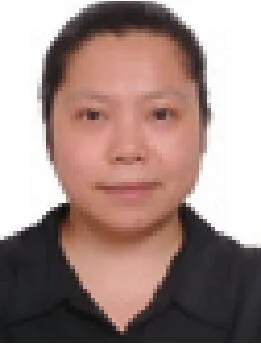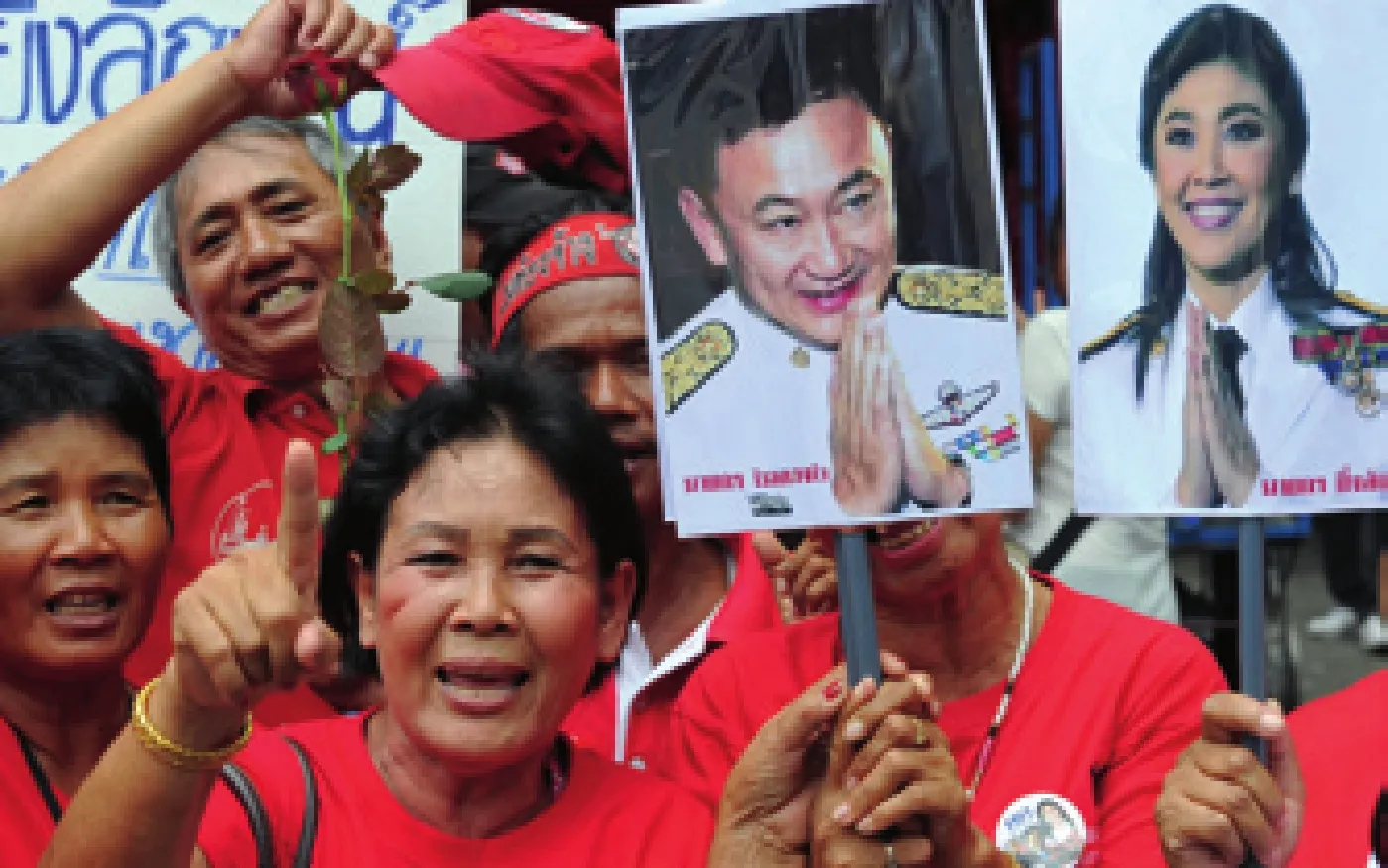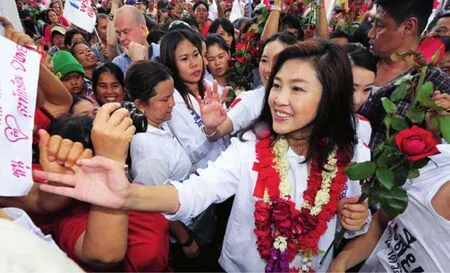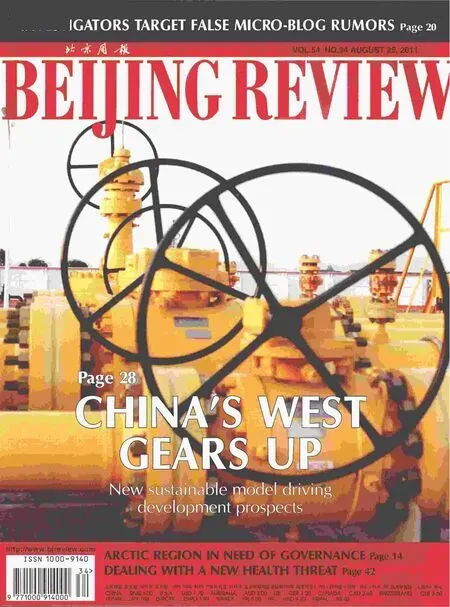Fresh Challenges and New Directions
By TANG QIFANG
By YU LINTAO
Fresh Challenges and New Directions
By TANG QIFANG

Thailand’s new Prime Minister Yingluck Shinawatra faces an uphill battle to unite a divided society
Ying luck Shinawatra, whose Pheu Thai Party won 265 seats in the 500-member lower house of Thailand’s parliament in the July 3 elections, was endorsed by the country’s king as its first female prime minister on August 10.
The success of this former businesswoman marks a major victory for Thailand’s grassroots,or rural majority who supported both Yingluck and her brother, exiled former Prime Minister Thaksin Shinawatra. Despite her landslide victory, a number of challenges await this Southeast Asian kingdom’s new prime minister.
Grassroots power
During the election campaign, Yingluck proved herself to be a charismatic political leader. But the major factor behind her victory remains her family name—Shinawatra.In other words, her victory was actually the victory of her brother Thaksin.
Thailand’s politics has traditionally been dominated by a small group of elites. Thai society remains hierarchal and this hierarchy has led to serious imbalances in the distribution of resources and privileges. As a result,the country suffers from a widening wealth divide, which has only further strengthened the existing hierarchy.
While Thailand’s middle class has grown signi fi cantly, the middle-class population is not large enough to break the elites’ stranglehold on politics. Only the country’s rural grassroots majority has the numerical strength to upset the established political order.
Thai politicians, however, used to focus their campaigns on the country’s cities. As rural residents were traditionally not engaged in politics, they had little interest in the election process and their votes were often bought by elite candidates. This focus on urban areas has created a growing gap in economic conditions between Thailand’s modern cities and its less developed countryside.
Thaksin was the first mainstream Thai politician to see the potential of a grassroots power base. In the 2001 elections, he put forward measures to promote rural development. After elected, he implemented successful agricultural policies. These policies brought tangible bene fi ts to farmers and thus won sincere support for him.
Thaksin inspired Thai farmers to participate in political affairs and fi ght for their rights.Thanks to his initiatives, Thailand’s grassroots majority effectively entered the political arena.
The power of the grassroots is not only evident from the landslide election victories achieved by Thaksin in 2001 and 2005, but also clear from persistent protests staged by his supporters, known as “red shirts,” following his exile. Notably, after Thaksin was deposed following a military coup in 2006, his ally, Samak Sundaravej, still secured victory in the 2007 elections. Yingluck’s victory this time is further proof of grassroots’ power.
Triple challenges
The power of the grassroots granted Yingluck’s Pheu Thai Party victory. But how to effectively harness this power and push Thailand toward stability and development will become the prime minister’s principal challenge. While Thaksin was able to bring the grassroots into politics, the past 10 years has seen Thailand’s rural majority grow in con fi dence.
The grassroots majority that brought Yingluck to power is highly conscious of itspolitical power. The “red shirts” engaged in fi ve years of aggressive street politics. Now they have seen their dream of establishing a pro-Thaksin government realized. The new leadership will have to deliver rapid reforms,or it too will potentially face their wrath.

POPULAR SUPPORT: “Red shirt” demonstrators hold up pictures of Thailand’s former Prime Minister Thaksin Shinawatra and Prime Minister Yingluck Shinawatra as they gathered in support of Yingluck in Bangkok on August 5

PEOPLE FIRST:Yingluck Shinawatra meets supporters as she campaigns in a suburb of Bangkok on June 30 ahead of Thailand’s parliamentary elections
Yingluck and her cabinet therefore will have to explore new ways to engage the majority in political affairs if they are to maintain the support of the grassroots.
The second major challenge confronting the new administration is how to defuse years of tension and anger between the pro-Thaksin “red shirts” and their opponents known as “yellow shirts.”
For years, Thailand has seen continuous turmoil and conflict between the two camps.The root of the problem lies in the fundamental con fl ict of interests between the country’s traditional elites, urban middle class and grassroots.Although Yingluck promised to achieve national reconciliation during her campaign, realizing genuine reconciliation will prove dif fi cult. The interests of the groups remain in conflict and renewed con fl ict is a possibility.
The third challenge facing the government is Yingluck’s own political inexperience and the fact that she is perceived as Thaksin’s spokesman. How to deal with her brother’s in fl uence will, to a large extent, determine the success or failure of her government.
A lack of political experience makes her vulnerable to attacks regarding her ability to govern, while dependence on Thaksin will expose her to criticism of being a puppet. Her closeness to Thaksin will potentially make her term more dif fi cult than those of Samak Sundaravej and Somchai Wongsawat, previous prime ministers allied to Thaksin.
Out of strife
With Yingluck now in control and the“red shirts” satis fi ed, it seems Thailand has emerged from its years of political strife, but the reality is unlikely to be so straightforward.
Thailand’s political dynamics remain unchanged. The dynamics are simple: If there are elections, Thaksin’s camp, who lack resources but are strong in numbers, will win.After the elections, the anti-Thaksin camp will fight back using its social resources to regain power. Once this happens, the pro-Thaksin camp will object strongly and even resort to violence. This is how the situation has played out over the past few years.
The root cause again is the conflict between Thailand’s different social strata.Whether this deadlock can be resolved will not only affect the future of Thailand’s politicians but ultimately affect the stability and prosperity of the whole country. A fi nal resolution of the problem relies on all sections of society behaving responsibly and considering the country’s long-term interests.
Yingluck’s team, working with the opposition, can encourage a resolution to Thailand’s deep-seated problems by working on two major spheres. First, they should work out a plan that will allow all groups to enjoy a more equal share in the bene fi ts of development and economic growth.Second, they should adjust Thailand’s political structure by giving farmers a bigger say in the political arena while seeking to prevent and address con fl icts between different interest groups based within a legal framework.
Mass political participation and social justice will inevitably prove to be the way forward. Cooperation and sharing responsibilities between different social strata are necessary conditions for stability, peace and development. Only by moving ahead in this direction will Thailand embrace a more stable and prosperous future.
The author is an assistant research fellow with the China Institute of International Studies
By YU LINTAO

